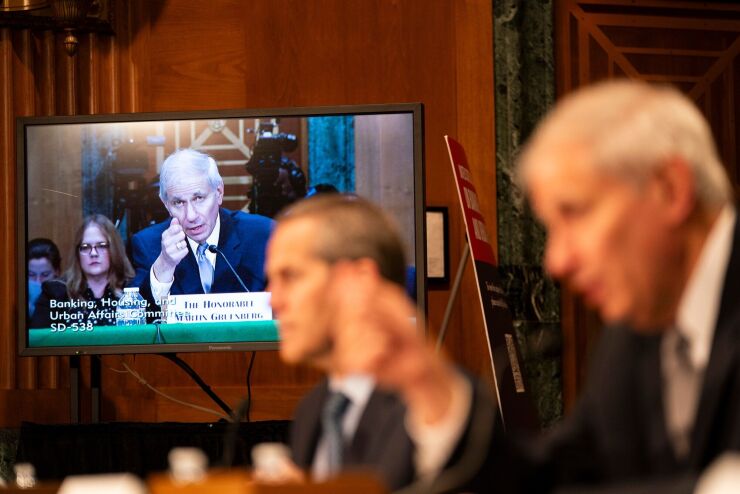
WASHINGTON — The government has a way of doing things in its own time. Almost everything that gets done has to follow rules, and those rules generally involve checking boxes and/or checking that the right boxes were checked in the right way. This deliberative approach to almost everything can be frustrating — as anyone who has applied for a passport or a building permit can tell you.
Scandals, however, have a way of making things that normally take a long time move quickly. In the case of the workplace scandal that has emerged at the Federal Deposit Insurance Corp. —
On Monday afternoon,
The conventional wisdom would hold that the White House and Senate would be happy to bide their time finding a replacement, make sure all the boxes are checked and likely await the outcome of the 2024 election before getting a head of steam on confirming a replacement. That may end up being what happens, but I think there's a significant chance that the White House and Senate find the necessary motivation to get a replacement confirmed fast.
As I said before, scandal has a way of getting politicians to do things quickly, and it's worth taking a moment to understand this scandal and why it might be motivating. The report, written by the law firm Cleary Gottlieb and commissioned by the FDIC itself after
Brown — who is
President Biden is in the same boat as Brown — he's up for reelection in a tight race, and like Brown he has his fingerprints on who is or isn't running the show at the FDIC and therefore owns the response to the scandal. The reasons to make a change are apparent: Gruenberg has been in FDIC leadership for almost 20 years, and we now have credible evidence that the agency has had a serious problem with workplace harassment going back at least that long. Whether he is singularly responsible for those conditions doesn't matter — if Gruenberg goes, he takes the political poison emanating from this report with him.
But by calling for Gruenberg's replacement rather than resignation creates an awkward interregnum where the guy who wasn't good enough to keep his job still has it while Republicans and iffy Democrats kick the tires on whomever Biden picks to take over. The administration — or Gruenberg, really — has conceded that he's not the man for the job of cleaning up that department, and so long as he remains that liability remains as well.
Moving quickly on a replacement, however, would have considerable advantages. For one, the public (when it is aware of anything the government does at all) is always impressed when something in Congress happens with due dispatch. The Senate as of right now is under Democratic control, and if a suitable replacement can be persuaded to take the job there isn't a great deal stopping Democrats from hearing confirmation testimony and holding a vote besides time on the legislative calendar — which Senate Majority Leader Charles Schumer has broad control of. The kinds of Democratic infighting that made the confirmation process so arduous at the beginning of the Biden administration might also be mitigated in the interest of putting this whole thing behind everyone.
Bringing a suitable replacement up for confirmation would also turn the tables on Republicans — many of whom have insisted that Gruenberg must go since the FDIC workplace allegations first came to light. While normally Republicans could vote against a Democratic administration's nominees with a clear conscience, in this case a vote against the new nominee is de facto a vote for Gruenberg's continued service at the FDIC — precisely the thing they said was not acceptable.
All of this depends on factors that are outside of anyone's control: the presence of a viable replacement for Gruenberg, the absence of an even more pressing crisis or scandal and the willingness of Senate leadership to give precious floor time to the confirmation of a B-tier agency head over, say, the confirmation of federal judges. As I said, the odds for a swift confirmation of Gruenberg's replacement are long — nothing in government moves quickly. But if the stars align and the motivation to move quickly can be found, it could save the administration a lot of trouble down the road.





